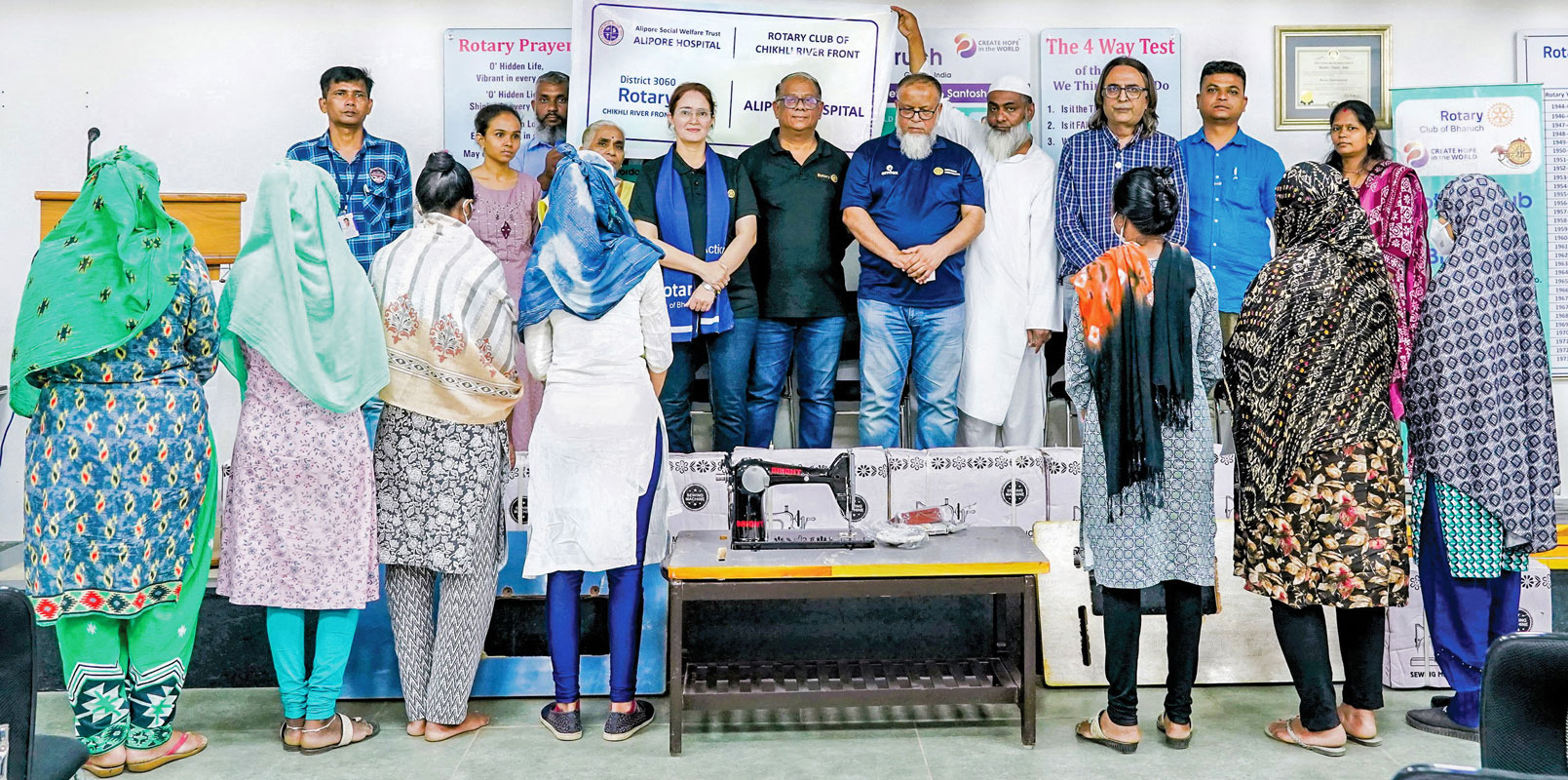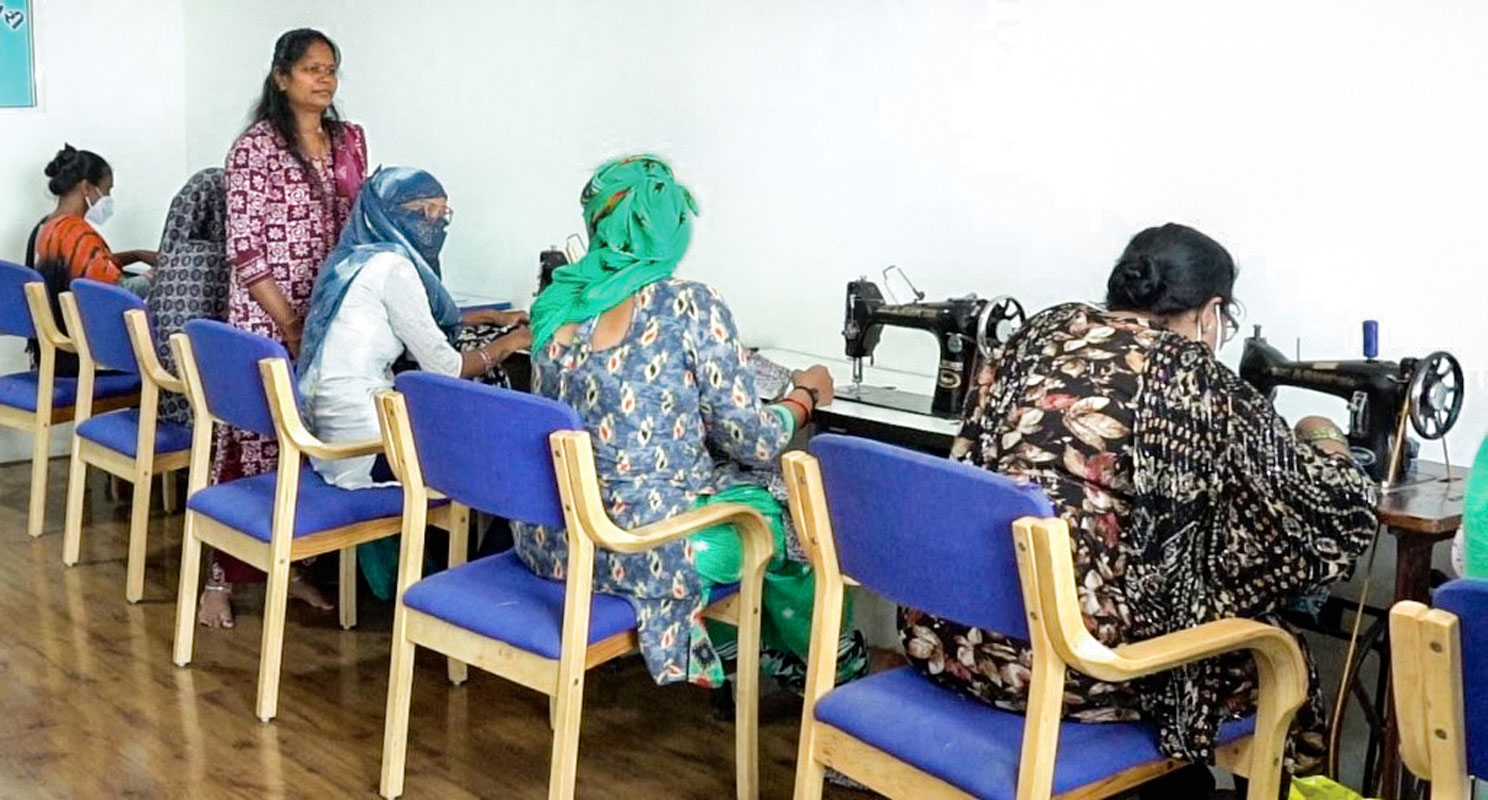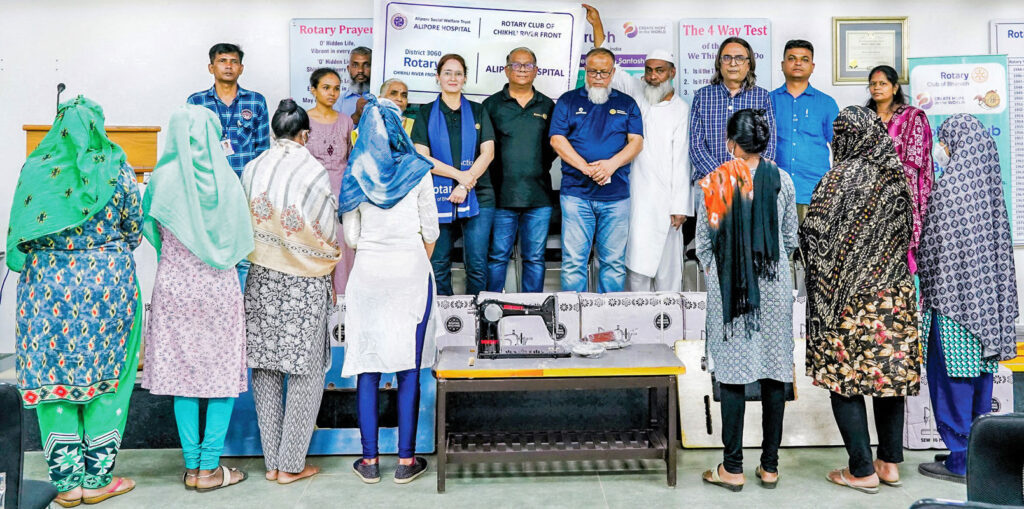When past present of the Rotary Club of Bharuch, RID 3060, Rizwana Zamindar set out on her ambitious goal of bringing both dignity and financial independence through a socially accepted vocation to a group of sex workers in the cities of Bharuch and Ankleshwar, she was driven by a single mantra. That was “how do we create hope through the magic of Rotary to ensure a life of dignity and respect for all women, for after all this is the basic right of every human being.”

She and her fellow club members set out to launch the project titled ‘Sakhi’, which was targeted “for women who are lost somewhere in the dark alleys of society.” Their sole objective was to pull out women who had taken to the flesh trade out of sheer desperation because they had no other options, and who were open to leaving their infamous profession if they were given any other viable option which could help meet their basic needs.
Supported by her husband Talkin, who is also a past president of the club, and has extended financial support to much of her community service work in Rotary, and the Development Support Team, Rizwana set about with great determination and steadfastness to reach out to those women who were willing to talk to her, and build their trust in her sincerity to help them.
“My team and I worked diligently to meet the female sex workers several times in small and large groups across the Bharuch and Ankleshwar region. We even provided transportation assistance by paying for their rickshaw trips, and engaged with brothel owners and brokers to examine the possibility of those wishing to leave being allowed to do so,” she recalls. Above all, Rizwana is proud that they were able to meet with success and break through the barrier of non-communication social activists normally encounter in such cases “mainly because our team built up a non-judgmental environment for them by organising psychiatric counselling sessions for them by Dr Sajid Day, a well-known psychiatrist in the city.”
Women are either tricked or sweet talked into this work. Others ended up in brothels due to extreme poverty; they often sell their bodies to run their homes, feed their children and pay school fees.
Gradually, the women opened up about their struggles and concerns as sex workers. Health camps were also organised to assess their medical needs and extend assistance if required. More important, the Rotarians helped these women to get access to some of the facilities available to them under welfare schemes of the government which are hardly known to them. The Sakhi project got a boost when it got support from the Bharuch district administration.
Talking to Rotary News about the issues that cropped up and the reasons that were enumerated by the sex workers for embracing this work, in a heart-to-heart chat with the Rotarians, Rizwana says, “I have always believed that every woman deserves to live with dignity and respect. But around us, we find so many women who also do work to earn a living, but their work is considered disrespectful, or taboo. Does anybody even spare any time to think about how or why they landed up doing this work?”
So what did she find to be the reasons, I ask her. “We found that many women end up in the sex trade because either they were tricked or sweet talked and human trafficked into this work. Others ended up in brothels due to extreme poverty; they have been selling their bodies to run their homes, feed their children and pay their school fees. Others were migrants and didn’t know what else to do.”

Working on this project for almost a year, the Rotarians found that the women here were as young as 18, and some rather elderly too. They also learnt that different kinds of compulsions and obligations suck these women into the flesh trade, but one thing was certain. “They are in constant fear of which client will behave in which manner with them. And yet every day, they end up at the designated pick-up spots.”
Rizwana recalls that when she and her team first started “meeting the women for this project, they were initially very scared of us, and hesitant even to talk, but slowly we won their confidence, and gradually they shed their fear and inhibition and started sharing their stories, their concern about the future, their fears. Some young women said they wanted to study and get a decent job, but the financial conditions in their families were such that they weren’t able to pay their college fees.”
Through Sakhi and the magic of Rotary, we want to create hope and ensure a life of dignity and respect for all women. For after all, this is the basic right of every human being.
— Rizwana Zamindar, past president, RC Bharuch
One of the sex workers told her that as they were struggling to remain in college and complete their education, “some of our friends said that by doing this we can earn more money and we thought why not try it. Initially I thought if I do this work for an hour or two and earn ₹500 to ₹1,000 what is wrong with this income. Initially I thought like that, but then realised that this was not the right way to make a living and decided to leave. I want to tell everybody, added that woman, that anybody can enter this profession, it is very easy to get in, but once you get in, it is very difficult to leave, for several reasons, including one’s own personal compulsions.”
After such close interactions with the sex workers, who were ready to come out, Rizwana and her team were even more determined that their project would rehabilitate the women who were willing to leave and ensure them dignified employment. “But we also told them to keep their expectations reasonable, and said that after leaving this work, maybe you’ll earn less, and might have to make some adjustments in your lifestyle… eating, drinking, dressing etc because the money you now earn will not be the same, but it will give you both dignity and peace of mind,” she added.
Gradually trust was built between both the groups, and following adequate counselling sessions, the Rotarians offered the women many options to earn a decent living and they chose tailoring as a viable option. A well-structured sewing and tailoring courses was planned for a batch of women, and the first milestone was reached with the successful completion of the first sewing course for a batch of 10, at the Rotary Club of Bharuch Narmada Nagri’s women empowerment centre. Credit for the successful training sessions went to club president Yuvrajsinh and past president Dhruv Raja.
But one key challenge remained — finding funds for the sewing machines for this trained batch of women. When they tried to get CSR funding, the Rotarians found that “while business companies appreciated the initiative’s importance, directly associating with the rehabilitation of these women is still considered taboo by some.” Fortunately, the Rotary Club of Chikli Riverfront and the Alipore Social Welfare Trust came forward to provide good quality sewing machines, thanks to the efforts of assistant governor Hassan Mayat and NGOs associated with him. They collectively sponsored all the machines.
Says a visually delighted Rizwana, “This is just the start of an important transformation. The Sakhi project represents the power of compassion, perseverance and the fundamental belief that every person deserves an opportunity for a dignified life. Their journey of empowerment with dignity has begun. When we saw the smiles on the faces of the first batch of trained women after they were given their gleaming new sewing machines, that was our reward!”







